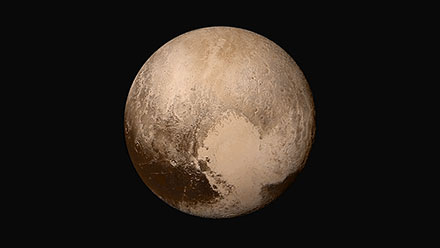20th Kaczmarczik Lecture
New Horizons & The Exploration of the Pluto System
S. Alan Stern, PhD
Principal Investigator of the New Horizons Mission to Pluto
Wednesday, February 10, 2016
12:00 p.m.
Main Building Auditorium
3141 Chestnut Street
Philadelphia, PA 19104
Register
 Credit: Johns Hopkins University Applied Physics Laboratory/Southwest Research Institute (JHUAPL/SwRI)
Credit: Johns Hopkins University Applied Physics Laboratory/Southwest Research Institute (JHUAPL/SwRI)
New Horizons is NASA’s historic mission to explore the Pluto system and the Kuiper Belt. The fastest spacecraft ever launched, New Horizons left Earth on January 19th 2006. It made the first exploration of the Pluto system—3 billion miles from Earth—this year, culminating with a highly successful flyby inside the orbits of all five of Pluto’s moons on July 14th. The spacecraft carries a sophisticated payload of imagers and other scientific instruments that were used to revolutionize our knowledge of Pluto and its five moons.
S. Alan Stern, PhD, will describe the history of this mission, the science behind it, the capabilities of the payload, our encounter with planet Pluto, and the major scientific discoveries made to date. He will also briefly outline the proposed New Horizons extended mission to fly across the Kuiper Belt, exploring further into space.
Alan Stern, PhD, is a planetary scientist, space program executive, aerospace consultant, and author. He leads NASA’s $723M New Horizon’s mission to Pluto and the Kuiper Belt.
In 2007, Stern was appointed NASA’s chief of all science missions and was named to the TIME 100, TIME magazine's list of the 100 most influential people in the world. Since 2009, he has been an Associate Vice President and Special Assistant to the President at the Southwest Research Institute. Additionally, he served on the board of directors of the Challenger Center for Space Science Education (2008-2012), as the Chief Scientist and Mission Architect for Moon Express (2010-2013), and as the Director of the Florida Space Institute (2011-2013). Currently, he is the chief scientist of WorldView, a near-space ballooning company, and of the Florida Space Institute.
Since 2008, Stern has also had his own aerospace consulting practice. His current and former clients include Jeff Bezos’s Blue Origin, Richard Branson’s Virgin Galactic, Naveen Jain’s Moon Express Google Lunar X-Prize team, Ball Aerospace, Paragon Space Development Corporation, the NASTAR Center, Embry Riddle Aeronautical University, and the Johns Hopkins University. Stern is also the CEO of two small corporations — Uwingu and The Golden Spike Company — and serves on the board of directors of the Commercial Spaceflight Federation.
As a researcher, Stern has been involved in 24 suborbital, orbital and planetary space missions, including 9 for which he was the mission principle investigator; and he has led the development of 8 scientific instruments for NASA space missions.
Before receiving his doctorate from the University of Colorado in 1989, Stern completed twin master's degrees in aerospace engineering and atmospheric sciences (1980 and 1981), and then spent six years as an aerospace systems engineer, concentrating on spacecraft and payload systems at the NASA Johnson Space Center, Martin Marietta Aerospace, and the Laboratory for Atmospheric and Space Physics at the University of Colorado. His two undergraduate degrees are in physics and astronomy from the University of Texas (1978 and 1980).
Stern's academic research has focused on studies of our solar system's Kuiper Belt and Oort cloud, comets, the satellites of the outer planets, the Pluto system, and the search for evidence of solar systems around other stars. He has also worked on spacecraft rendezvous theory, terrestrial polar mesospheric clouds, galactic astrophysics, and studies of tenuous satellite atmospheres, including the atmosphere of the moon.
Stern is a fellow of the AAAS, the Royal Astronomical Society, and the IAF, and is a member of the AIAA, AAS, and the AGU; he was elected incoming chair of the Division of Planetary Sciences in 2006. He has been awarded the Von Braun Aerospace Achievement Award of the National Space Society, the 2007 University of Colorado George Norlin Distinguished Alumnus Award, the 2009 St. Mark’s Preparatory School Distinguished Alumnus Award, and Smithsonian Magazine’s 2015 American Ingenuity Award.
About the Kaczmarczik Lecture
Paul Kaczmarczik began his career as a professor of physics at Drexel University in 1953. A key player in building the Physics and Atmospheric Science Department, he made important contributions to teaching at Drexel University during his many years of service. Well-liked by both his colleagues and his students, Professor Kaczmarczik became Professor Emeritus in 1989. The Kaczmarczik Lecture Series was established in 1995 in honor of Professor Kaczmarczik. It brings to Drexel outstanding scientists to present lectures on topics at the cutting edge of physics research.